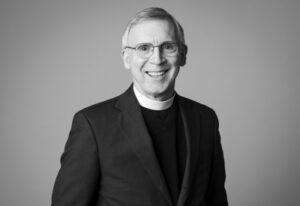 Dear Friends,
Today, the Alcoholic Anonymous group that meets at Trinity celebrates its thirty-second anniversary of gathering here. This church, like many other churches, has opened its doors to A.A., recognizing that the way A.A. helps alcoholics recover – built on the simple idea of one alcoholic sharing with another – has made it possible for thousands of people to gain and maintain sobriety.
The A.A. group at Trinity meets Monday – Friday at noon. Like every other A.A. group, the one that meets here welcomes anyone who has a desire to stop drinking, regardless of race, gender, sexual orientation, religion, income or profession. Participation is free.
A.A.’s program begins with the first step: “We admitted that we were powerless over alcohol – that our lives had become unmanageable” and continues through the twelfth step – the Twelve Steps, as they are known. Combined with the Twelve Traditions, they provide a path to personal recovery and the basis for the organization of the group.
Bill W. and Dr. Bob are recognized as A.A.’s founders. Both had initially been members of the Oxford Group, a non-denominational movement modeled after first-century Christianity. The tenets and practices of an American Oxford Group greatly influenced the 12 Steps of Alcoholics Anonymous.
An Episcopal priest also had a significant role in A.A.’s founding. Sam Shoemaker was rector of Calvary Episcopal Church in New York City which was the United States headquarters of the Oxford Group. Bill W. attended Oxford Group meetings there and became close friends with Shoemaker. Shoemaker helped start other Oxford Group chapters including one in Akron, Ohio, where Dr. Bob, a surgeon, became involved. Bill W. met Dr. Bob during a business trip to Akron. He worked with Dr. Bob, who had been unable to stay sober, for 30 days – one alcoholic helping another – the model that has continued throughout the organization’s history. Dr. Bob drank his last drink on June 10, 1935, marked by A.A. as the date of its founding.
How significant was Shoemaker in A.A.’s founding? Bill W. once wrote that “Sam Shoemaker was one of A.A.’s indispensables. Had it not been for his ministry to us in our early time, our Fellowship would not be in existence today.” In another place, he wrote: “The early A.A. got its ideas of self-examination, acknowledgment of character defects, restitution for harm done, and working with others straight from the Oxford Groups and directly from Sam Shoemaker, their former leader in America, and from nowhere else.”
For people who have a problem with alcohol, A.A. has a simple program that works. How blessed Trinity is to have them as one of our building partners! Happy 32nd anniversary.
Blessings,
Stephen Applegate
Dear Friends,
Today, the Alcoholic Anonymous group that meets at Trinity celebrates its thirty-second anniversary of gathering here. This church, like many other churches, has opened its doors to A.A., recognizing that the way A.A. helps alcoholics recover – built on the simple idea of one alcoholic sharing with another – has made it possible for thousands of people to gain and maintain sobriety.
The A.A. group at Trinity meets Monday – Friday at noon. Like every other A.A. group, the one that meets here welcomes anyone who has a desire to stop drinking, regardless of race, gender, sexual orientation, religion, income or profession. Participation is free.
A.A.’s program begins with the first step: “We admitted that we were powerless over alcohol – that our lives had become unmanageable” and continues through the twelfth step – the Twelve Steps, as they are known. Combined with the Twelve Traditions, they provide a path to personal recovery and the basis for the organization of the group.
Bill W. and Dr. Bob are recognized as A.A.’s founders. Both had initially been members of the Oxford Group, a non-denominational movement modeled after first-century Christianity. The tenets and practices of an American Oxford Group greatly influenced the 12 Steps of Alcoholics Anonymous.
An Episcopal priest also had a significant role in A.A.’s founding. Sam Shoemaker was rector of Calvary Episcopal Church in New York City which was the United States headquarters of the Oxford Group. Bill W. attended Oxford Group meetings there and became close friends with Shoemaker. Shoemaker helped start other Oxford Group chapters including one in Akron, Ohio, where Dr. Bob, a surgeon, became involved. Bill W. met Dr. Bob during a business trip to Akron. He worked with Dr. Bob, who had been unable to stay sober, for 30 days – one alcoholic helping another – the model that has continued throughout the organization’s history. Dr. Bob drank his last drink on June 10, 1935, marked by A.A. as the date of its founding.
How significant was Shoemaker in A.A.’s founding? Bill W. once wrote that “Sam Shoemaker was one of A.A.’s indispensables. Had it not been for his ministry to us in our early time, our Fellowship would not be in existence today.” In another place, he wrote: “The early A.A. got its ideas of self-examination, acknowledgment of character defects, restitution for harm done, and working with others straight from the Oxford Groups and directly from Sam Shoemaker, their former leader in America, and from nowhere else.”
For people who have a problem with alcohol, A.A. has a simple program that works. How blessed Trinity is to have them as one of our building partners! Happy 32nd anniversary.
Blessings,
Stephen Applegate Dear Friends,
Today, the Alcoholic Anonymous group that meets at Trinity celebrates its thirty-second anniversary of gathering here. This church, like many other churches, has opened its doors to A.A., recognizing that the way A.A. helps alcoholics recover – built on the simple idea of one alcoholic sharing with another – has made it possible for thousands of people to gain and maintain sobriety.
The A.A. group at Trinity meets Monday – Friday at noon. Like every other A.A. group, the one that meets here welcomes anyone who has a desire to stop drinking, regardless of race, gender, sexual orientation, religion, income or profession. Participation is free.
A.A.’s program begins with the first step: “We admitted that we were powerless over alcohol – that our lives had become unmanageable” and continues through the twelfth step – the Twelve Steps, as they are known. Combined with the Twelve Traditions, they provide a path to personal recovery and the basis for the organization of the group.
Bill W. and Dr. Bob are recognized as A.A.’s founders. Both had initially been members of the Oxford Group, a non-denominational movement modeled after first-century Christianity. The tenets and practices of an American Oxford Group greatly influenced the 12 Steps of Alcoholics Anonymous.
An Episcopal priest also had a significant role in A.A.’s founding. Sam Shoemaker was rector of Calvary Episcopal Church in New York City which was the United States headquarters of the Oxford Group. Bill W. attended Oxford Group meetings there and became close friends with Shoemaker. Shoemaker helped start other Oxford Group chapters including one in Akron, Ohio, where Dr. Bob, a surgeon, became involved. Bill W. met Dr. Bob during a business trip to Akron. He worked with Dr. Bob, who had been unable to stay sober, for 30 days – one alcoholic helping another – the model that has continued throughout the organization’s history. Dr. Bob drank his last drink on June 10, 1935, marked by A.A. as the date of its founding.
How significant was Shoemaker in A.A.’s founding? Bill W. once wrote that “Sam Shoemaker was one of A.A.’s indispensables. Had it not been for his ministry to us in our early time, our Fellowship would not be in existence today.” In another place, he wrote: “The early A.A. got its ideas of self-examination, acknowledgment of character defects, restitution for harm done, and working with others straight from the Oxford Groups and directly from Sam Shoemaker, their former leader in America, and from nowhere else.”
For people who have a problem with alcohol, A.A. has a simple program that works. How blessed Trinity is to have them as one of our building partners! Happy 32nd anniversary.
Blessings,
Stephen Applegate
Dear Friends,
Today, the Alcoholic Anonymous group that meets at Trinity celebrates its thirty-second anniversary of gathering here. This church, like many other churches, has opened its doors to A.A., recognizing that the way A.A. helps alcoholics recover – built on the simple idea of one alcoholic sharing with another – has made it possible for thousands of people to gain and maintain sobriety.
The A.A. group at Trinity meets Monday – Friday at noon. Like every other A.A. group, the one that meets here welcomes anyone who has a desire to stop drinking, regardless of race, gender, sexual orientation, religion, income or profession. Participation is free.
A.A.’s program begins with the first step: “We admitted that we were powerless over alcohol – that our lives had become unmanageable” and continues through the twelfth step – the Twelve Steps, as they are known. Combined with the Twelve Traditions, they provide a path to personal recovery and the basis for the organization of the group.
Bill W. and Dr. Bob are recognized as A.A.’s founders. Both had initially been members of the Oxford Group, a non-denominational movement modeled after first-century Christianity. The tenets and practices of an American Oxford Group greatly influenced the 12 Steps of Alcoholics Anonymous.
An Episcopal priest also had a significant role in A.A.’s founding. Sam Shoemaker was rector of Calvary Episcopal Church in New York City which was the United States headquarters of the Oxford Group. Bill W. attended Oxford Group meetings there and became close friends with Shoemaker. Shoemaker helped start other Oxford Group chapters including one in Akron, Ohio, where Dr. Bob, a surgeon, became involved. Bill W. met Dr. Bob during a business trip to Akron. He worked with Dr. Bob, who had been unable to stay sober, for 30 days – one alcoholic helping another – the model that has continued throughout the organization’s history. Dr. Bob drank his last drink on June 10, 1935, marked by A.A. as the date of its founding.
How significant was Shoemaker in A.A.’s founding? Bill W. once wrote that “Sam Shoemaker was one of A.A.’s indispensables. Had it not been for his ministry to us in our early time, our Fellowship would not be in existence today.” In another place, he wrote: “The early A.A. got its ideas of self-examination, acknowledgment of character defects, restitution for harm done, and working with others straight from the Oxford Groups and directly from Sam Shoemaker, their former leader in America, and from nowhere else.”
For people who have a problem with alcohol, A.A. has a simple program that works. How blessed Trinity is to have them as one of our building partners! Happy 32nd anniversary.
Blessings,
Stephen Applegate